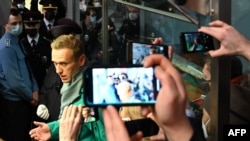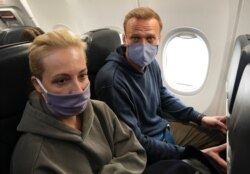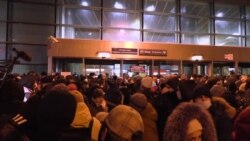A judge in Moscow has ruled that Kremlin critic Alexei Navalny should be held in police custody for 30 days, following his arrival back in Russia on Sunday.
Navalny was detained upon his arrival in Moscow Sunday evening — his first time back in his home country since the Russian opposition politician was poisoned last August and evacuated for treatment abroad.
Traveling from Germany, Navalny was detained by police in black masks while entering passport control at Moscow’s Sheremetyevo airport.
His lawyer, who was traveling with him, was not allowed to accompany him. Navalny managed to kiss his wife, Yulia Navalnaya, before being led away.
His whereabouts were not immediately known, prompting the hashtag #where’sNavalny to trend on Russian Twitter.
A happy day
“I’m very happy to have arrived. This is my best day in five months,” Navalny said in a brief statement to journalists before his detention.
His return capped a nearly five-month odyssey that began after he was poisoned with a Soviet-era, military-grade nerve agent while traveling in Siberia last August.
Navalny has openly accused President Vladimir Putin of ordering Russia’s security services to carry out the attack, a charge the Kremlin vehemently denies.
An independent media investigation has since alleged Russian Federal Security (FSB) agents tracked the opposition politician in the months, days and even hours leading up to the attack.
Yet Russian authorities justified his detention Sunday by arguing Navalny was simply in violation of a parole stemming from a 2014 suspended sentence and his convalescence abroad.
“Further measures in relation to Navalny will be determined by the courts,” the country’s prison services said in a statement.
The government has also opened three other criminal investigations against the opposition leader, a confluence of events that Navalny supporters argue are an attempt to force the opposition politician into exile abroad.
He faces a minimum of 3½ years in prison.
“I am not afraid. I know that I am right. I know all the criminal cases against me are fabricated,” Navalny said, addressing the threat of imprisonment.
For years, the Kremlin has sought to downplay Navalny’s political significance, even repeatedly referring to him as “the Berlin patient” or “some blogger” rather than by name since the August attack.
Indeed, reacting to news of Navalny’s arrest Sunday, Kremlin spokesman Dmitry Peskov continued to claim ignorance of a news event that dominated headlines at home and abroad.
“I’m sorry. He was arrested in Germany?” Peskov said. “I wasn’t aware.”
Better off airports
Navalny’s return had other surprises.
Navalny’s plane, operated by Russian state-affiliated airline Pobeda, had been scheduled to land in Moscow’s Vnukovo airport.
Several thousand Navalny supporters gathered outside the air terminal in minus 20 degrees Celsius conditions in a show of support for what they regard as Russia’s opposition leader.
"Alexei Navalny inspires many people in Russia. He has no fear. He’s not afraid of death or being in prison,” said Anna, 37, a Moscow librarian in an interview with VOA.
“The people are proud of him. He couldn’t not come. He can’t be a politician abroad and fight the regime,” said Ilya, 18, a student at Moscow’s Higher School of Economics.
“If they arrest him, he’ll be like Nelson Mandela,” added his friend Alexei, 18, referring to the South African political icon.
The Moscow Prosecutor-General’s Office had warned the show of support was illegal because it had not been sanctioned by the authorities.
Citing COVID-19 restrictions, the airport also said it would not allow media inside.
However, airport officials had little problem with an impromptu gathering of fans hoping to welcome Russia pop star Olga Buzova home.
Meanwhile, police in riot gear carried out several dozen arrests outside as the crowd chanted “shame” and “Navalny is our President” before dispersing as news emerged that the plane would be landing at Sheremetyevo.
At Sheremetyevo, several hundred well-wishers managed to greet Navalny’s wife, Yulia, as she exited — without her husband.
The arrivals lounge broke out into applause.
International reaction
News of Navalny’s arrest was met with international condemnation.
The United States strongly condemned Navalny’s arrest and demanded his immediate and unconditional release.
“We note with grave concern that his detention is the latest in a series of attempts to silence Navalny and other opposition figures and independent voices who are critical of Russian authorities,” Secretary of State Mike Pompeo said in a statement Sunday.
“Confident political leaders do not fear competing voices, nor commit violence against or wrongfully detain political opponents,” Pompeo said, adding that the Russian people deserve “to exercise their basic human rights of speech and assembly without fear of retribution.”
Incoming U.S. national security adviser for President-elect Joe Biden, Jake Sullivan, said in a post to Twitter. “Navalny should be immediately released, and the perpetrators of the outrageous attack on his life must be held accountable.”
“The Kremlin’s attacks on Mr. Navalny are not just a violation of human rights, but an affront to the Russian people who want their voices heard,” Sullivan added.
Charles Michel, president of the European Council, called the arrest “unacceptable” and demanded Navalny’s freedom.
There were immediate questions as to what actions Western governments might take.
Officials from Lithuania and Czech Republic indicated they would explore imposing sanctions on the Kremlin over the matter.
A Siberian poisoning
Navalny fell ill last August on a flight from Tomsk to Moscow and was treated and placed in an induced coma in a Siberian hospital before being transferred to a medical facility in Berlin, Germany.
Lab tests in three European countries, confirmed by the Organization for the Prohibition of Chemical Weapons, established Navalny was poisoned with a nerve agent of the Novichok class.
The findings led the European Union to imposed sanctions on six Russian officials and a state research institute.
Russian authorities have claimed that no trace of poison was found in Navalny's body before he was airlifted to Germany and have refused to open a criminal investigation into the incident.
On the eve of Navalny’s return, German authorities provided additional information on the case, including blood and tissue samples.
A German Justice Ministry spokesman said Berlin expects that "the Russian government will now immediately take all necessary steps to clarify the crime against Mr. Navalny.”
"This crime must be solved in Russia," the spokesman added.
VOA's Esha Sarai contributed to this report.













